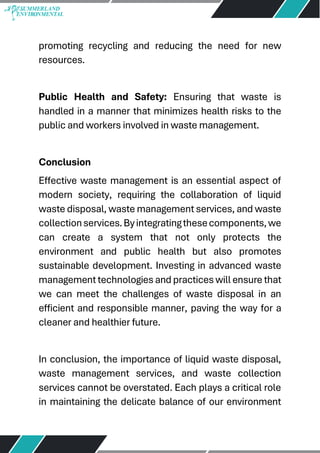The Best Guide To Reclaim Waste
The Best Guide To Reclaim Waste
Blog Article
Reclaim Waste Can Be Fun For Everyone
Table of ContentsThe Main Principles Of Reclaim Waste The Best Guide To Reclaim WasteReclaim Waste Fundamentals ExplainedGet This Report on Reclaim WasteThe smart Trick of Reclaim Waste That Nobody is Discussing
Domestic sewer waste refers to the waste and items from a residential septic storage tank. The correct management and disposal of domestic sewer waste call for fluid waste to be moved to a sewer therapy plant where the proper techniques and devices are used to purify and dispose of waste.
Business waste typically consists of prospective threats, such as flammable materials or a mixture of liquid and strong waste items, and requires a much more innovative and comprehensive disposal procedure. The disposal of commercial waste generally includes the filtration of waste before transportation to make certain safe and appropriate disposal. Hazardous waste is created from by-products and overflow of commercial procedures and manufacturing.
This kind of waste can not make use of the same sewer monitoring transportation or procedures as septic or business fluids. The hazardous waste monitoring procedure calls for the assessment and screening of fluid waste prior to it undertakes the disposal procedure (industrial wastewater treatment). Drainage waste is the fluid waste that comes from runoff and excess stormwater in highly populated areas or cities
Runoff waste can cause contamination and flooding otherwise taken care of correctly. Discover more about sewer cleansing and waste monitoring. Ensuring correct waste monitoring can protect against calamities and lower ecological injury. Both individuals in residential settings and specialists in commercial or production markets can profit from recognizing the processes and guidelines of liquid waste monitoring.
Reclaim Waste - Truths
Get in touch with PROS Services today to learn about our waste management and disposal services and the appropriate means to look after the liquid waste you generate.
(https://reclaimwaste1.edublogs.org/2024/11/12/efficient-liquid-waste-removal-and-disposal-your-complete-guide-to-sustainable-waste-management/)Do you recognize what occurs to your water when you end, flush the commode or drain pipes the cleaning maker? No? Well, it's worth recognizing. This so-called 'wastewater' is not just an essential resource but, after therapy, will certainly be released to our land, rivers or the sea. Made use of water from bathrooms, showers, baths, cooking area sinks, washings and industrial processes is called wastewater.

water made use of to cool equipment or tidy plant and devices). Stormwater, a type of wastewater, is drainage that flows from agricultural and metropolitan areas such as roofs, parks, gardens, roads, courses and rain gutters right into stormwater drains, after rainfall. Stormwater moves without treatment straight to regional creeks or rivers, at some point reaching the ocean.
Top Guidelines Of Reclaim Waste
In Queensland, most wastewater is dealt with at sewer therapy plants. Wastewater is delivered from residential or industrial websites with a system of sewage systems and pump terminals, referred to as sewerage reticulation, to a sewer therapy plant. Regional federal governments build, maintain and operate most sewage treatment plants. Operators are licensed under the Environmental Management Act 1994 to release treated wastewater at an appropriate ecological requirement into rivers.
The Department of Natural Resources recommends regional federal governments regarding managing, operating and preserving sewage systems and treatment plants. In unsewered locations, city governments might need householders to mount specific or family sewage therapy systems to deal with domestic wastewater from toilets, kitchen areas, washrooms and washings. The Division of Natural Resources authorises using family systems when they are confirmed to be efficient.
Most stormwater receives no treatment. In some brand-new class, treatment of some stormwater to get rid of trash, sand and gravel has actually begun making use of gross contaminant traps. Wastewater therapy happens in four stages: Gets rid of strong issue. Bigger solids, such as plastics and various other things wrongly discharged to drains, are removed when wastewater is travelled through displays.
Makes use of tiny living organisms understands as micro-organisms to break down and get rid of staying liquified wastes and great particles. Micro-organisms and wastes are integrated in the sludge.
Reclaim Waste Things To Know Before You Get This
Nutrient elimination is his comment is here not offered at all sewer therapy plants due to the fact that it needs pricey specialised tools. Clear fluid effluent generated after treatment may still have disease-causing micro-organisms - liquid waste disposal.

Most wastewater flows into the sewage system. Under the Act, local federal governments provide approvals and permits for eco appropriate tasks (Ages) entailing wastewater launches that might have a neighborhood impact.
About Reclaim Waste
Otherwise, examples are taken for laboratory evaluation. Commonly many tests are required to establish the levels of each of the different pollutants such as oils, hefty steels and pesticides in water. Tracking supplies valid information about water high quality and can verify that permit problems are being met. The info acquired with surveillance provides the basis for making water quality decisions.
Report this page